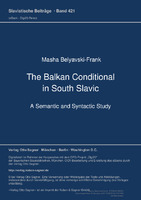The Balkan Conditional in South Slavic
A Semantic and Syntactic Study
Abstract
This study examines the morphological and semantic development of the modal construction formed with either the imperfect of 'to want' (Croatian/Serbian) plus the infinitive, or with a modal particle from 'to want' (Macedonian) plus the imperfect of the main verb. The Balkan conditional is analyzed using material from diverse sources, including epic folk poetry, dialectal texts, and the standard literary language in the South Slavic languages, as well as in the Balkan non-Slavic languages of Greek, Albanian, Daco-Rumanian, Istro-Rumanian, and Arumanian. Specific syntactic and semantic contexts are analyzed, and the Balkan conditional is compared to other modal constructions in these languages. One of the characteristic analytic verbal forms shared by the languages of the Balkan league is the Balkan conditional or the so-called 'future-in-the-past'. In the majority of these languages, the Balkan conditional has the status of a grammatical category, whose invariant components are 'modality', specifically 'potentiality', and 'reference to past tense'. With such components, these expressions most frequently and naturally refer to actions which did not take place, i.e., the past, contrary-to-fact conditional.
Keywords
analytic verbal forms; Balkan; Belyavski; bulgarian balkan conditonal; Conditional; Frank; Gallipoli and Toriak dialects; macedonian balkan conditional; Semantic; Slavic; slavic modal system; South; Study; SyntacticDOI
10.3726/b12699ISBN
9783954790234OCN
1083018927Publisher website
https://www.peterlang.com/Publication date and place
Bern, 2003Series
Slavistische Beitraege, 421Classification
Language and Linguistics


 Download
Download